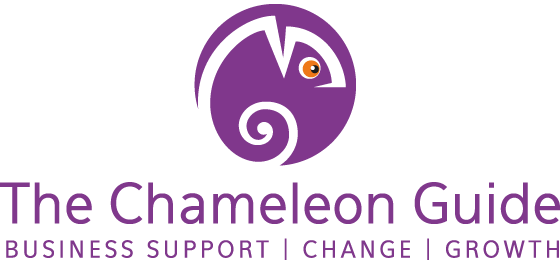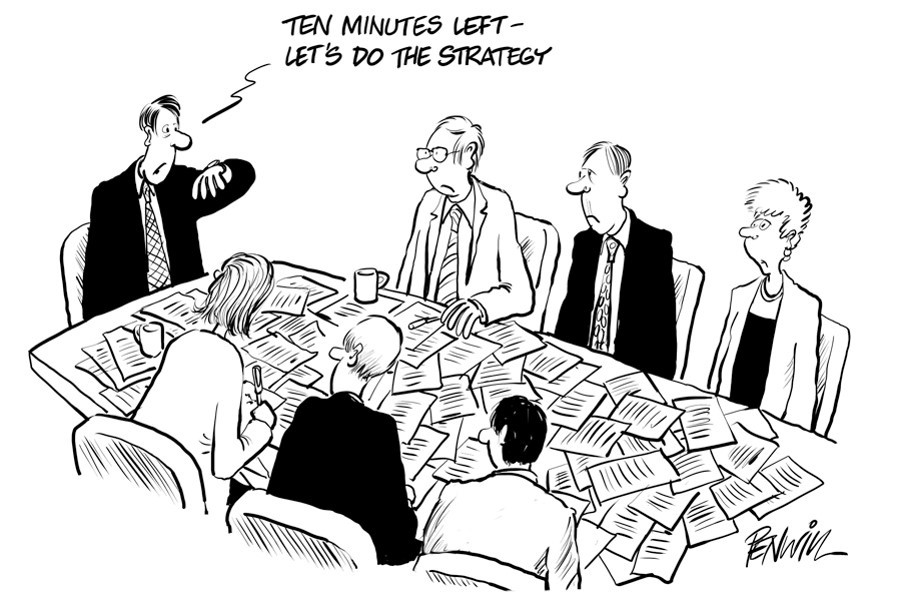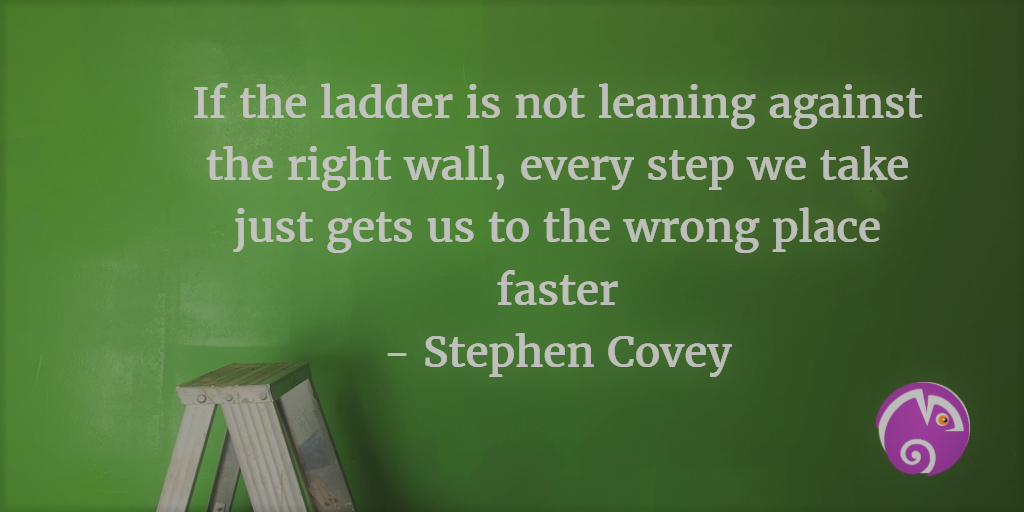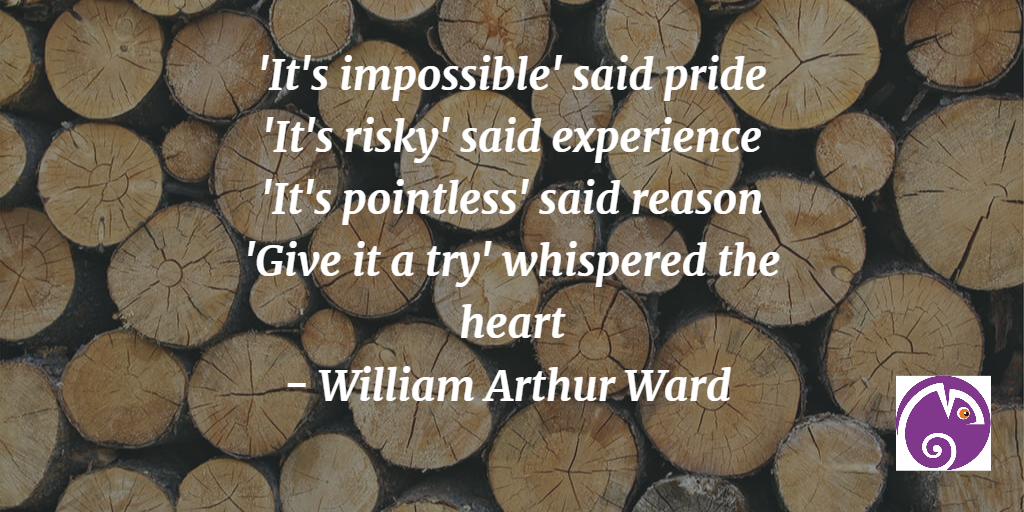
Grow your business - getting the right strategy
Karen Espley
The Chameleon Guide.

Karen Espley
The Chameleon Guide.
Hands up if you want your business to grow profitably allowing you to live the life you dreamed of when you first started off on this great adventure called entrepreneurship?
If you didn't put your hand up, then stop reading now and go do something more fun.
For those of you with your hands up, you can put them down now, and hurrah! To me, the ultimate aim of my business is to have one that I've built on my terms, doing it my way and to be proud of what I've achieved.
One of the ways to do this is to create a sellable business, even if you don’t actually want to sell it.
Why is this? Because the actions you take to create a company that someone else wants to buy creates a business that works for you and creates profits. All this without you having to flog yourself into the ground every day. Sounds good doesn’t it?
This e-book is a chapter of my full e-book - 'How to increase the value in your business in seven short(ish) steps' which looks at what these actions are and gives you ideas for you to implement.
This one is all about getting your strategy sorted as this underpins everything else you do.
I know it’s an overused phrase, but you really do need to know where your business is going otherwise, how will you know when you’ve got there?.
I hope you enjoy it and find plenty of useful actions to take that will really help you grow your business.

Strategy. Does this word put the fear of god into you, or at least make your brain switch off?
It can be such a scary word and one that many small business owners claim is
not for them.
But it doesn’t need to be scary – honestly.
A good strategy should be a living document that you refer to time and time again – it’s like the blueprint for your business.
It’s different from a business plan. A business plan does share some of the same content as a strategy. But it’s primarily put together if you are looking
to raise money or work with a business partner for example. It gets written, used for that purpose and then tends to sit in a drawer gathering dust.
The strategy should be there as your touchstone. It keeps you focussed and can help you make decisions. If you come up with a new product or service idea, you can use the strategy to help work out whether to include it. If it’s something that’s going to move your business in line with your strategy, then great. But if it’s going to be a distraction or it doesn’t help move you in the right direction – you should say no. Go write it on a board somewhere if you don’t want to forget it, but don’t prioritise it.
The first question I ask my clients is:
This is a really important question as it will affect where you take your strategy.
For example, is it your long term aim to sell?
Interestingly people who say no they don’t want to sell their business, will say, well of course, if they offered me a million, I’d sell it. It’s good to do that test on yourself. One lady I spoke to said she didn’t want to sell until I asked about the price she would sell at. A price tag of £1million would do her nicely. And in her case it wasn’t an unrealistic figure.
Equally I had another client, who is adamant they will take him out of his
business in a coffin!
Or are you looking for the business to keep running and give you a good standard of living, but allow you take a step (or several steps) back from the
day to day running?
I had another client for whom this is true. She was happy with the level of money she earned, but wanted to be able to semi retire and move to Spain with her husband. She’d still be involved but at arms’ length. We worked on
getting someone in and trained up to do what she does. It also needed her to increase sales in order to pay for the manager to make sure she could still
take the same amount. She’s now planning that semi-retirement in earnest.
Firstly the vision – where do you want to take your business? This should be not only for the business, but for yourself as well.
Ask yourself these questions:
The more specific you can be, the better. Write down exactly how it looks. A
client pinned it all down perfectly - he knows how many days a week he’s going to be working, how much money he’s going to be earning and visiting
his grandchild in Exeter once a month!
The next thing to look at it your values.
These are important for your business because they are how you show up in the world.
The values you have will be the same for your business as they are for you.
They help you work out which clients you want to work with, or partners you may wish to do business with and as importantly, who you take on as employees.
So many business owners who have employees complain that their staff
aren’t as committed as them and don’t seem to care in the same way.
This is where your values are crucial. When you are employing people, not
only should you be checking to see that they can do the job, but that they also share your values.

If one of your values is that 100% quality is important, you need to ask questions around what they think is good enough because it’s never going to work with an employee who thinks 90% is good enough. It will just frustrate you and they won’t get why you’re so stressed about it. But even if they make what may seem like a silly little mistake, it may impact negatively on your clients and your business.
As Jim Collins, author of 'Good to Great' says – it’s far better not to hire than to hire the wrong person.
It costs you time, money and possibly your reputation.
See chapter 7 of my full e-book 'How to increase the value in your business in seven short(ish) steps' for ways to recruit and retain the right people.
How do you identify your values?
You can do it a number of ways, but I find this method is the easiest.
List out all the things that others do or situations that - Anger you - Irritate
you - Make you anxious
Then group them together by common themes.
Your values are the opposite of these situations.
For me the list includes:
- People who won’t take no for an answer/are way too pushy
- People who play the victim or won’t take responsibility for their actions
- People who talk over me
- Bullies
- Rudeness
- Angry people who shout at me
- People who don’t respond to emails, particularly when I have done them a favour
- People who take themselves too seriously
There are others, but out of this list I ended up with this list of values:
- Responsibility
- Consideration
- Integrity
- Action oriented
- Kindness
- Fun
- Humour
- Quality focus
- Honesty
- Doing what needs to be done
There is a school of argument that says you should cut this list down to the three that are most important to you, but I like having that full list.
They inform my behaviour and I like to work with others who share similar
values. But my top two are:
Other examples from my clients include:
The next thing to look at is your most valuable clients.
Who are they?
They are the ones who make you the most money, are profitable and they buy from you time and again.
Importantly, the should also be people with whom you love working.
As a (very) rough rule of thumb, you get 80% of your business from 20% of your clients. These are the ones you want to work with and then find more clients who look like them.
I was working with an IT support company and they had a client list of over 2000. The majority of these were individuals who phoned up for issues with their laptops. But when we looked at their figures, they were getting the majority of their business from (around 20) companies - that were mostly on support contracts.
By showing them that they got the most money (and profit) from these support contracts we changed the business model to focus on those kinds of clients. We redeveloped the website so it's aimed at small businesses. We worked on developing marketing and processes to make sure they
grow in this sector.
Before, the owner and his team were spending their time driving to individuals, earning £75 for an hour’s work. By the time you added in their travelling time, the hourly rate plummeted to less than £35 per hour!
Why not take a look at your customers and rank them by revenue, repeat business and profitability and see if there are any patterns?
See if you can identify who the most profitable ones are.
Identifying your most valuable customers will help you work out what your niche is. What makes you different from others? This can be the most challenging area as it’s very unlikely that you will be the only business doing
what you are doing.
This is be covered in more depth in Chapter 8 of my full e-book - How to increase the value in your business in seven short(ish) steps.
It’s also important to look at the market in which you are competing.
You can learn a lot from your competitors:
And look at the wider context – is your market evolving or are there any threats on the horizon that you need to prepare for? For example if you’re a business that exports to Europe - there is a huge potential threat with the Brexit shenanigans and you’ll need to prepare for the new world.
An IFA client discovered a great opportunity off the back of Brexit supporting the scared and confused with their investments. He got flooded with calls after Brexit happened. And of course with the markets in turmoil, there are always opportunities for good investments now whilst share prices are depressed.
Another client added auto-enrolment services to her payroll offering. She spotted an opportunity that gave her the potential to treble her revenue.
It’s important to work out what the measures are to help you keep your business on target.
You want to make them simple and easy to collect the information for. And
then you need to check against them on a regular basis to make sure you are
on track.
They also need to make sense to your business and may change depending on the type of business you have.
I always recommend that you review your business at least monthly so you can see where things might be going wrong so you can make adjustments before it’s too late.

| Actions |
| 1. Write down the vision for you and your business. Work out what success looks and feels like.
2. Values – write down your values. You may want to order them into your top five. 3. Most valuable customers – look at your data to see if you can identify your most valuable customers and see if there are any trends 4. Your niche – we will be covering this in much more detail in Chapter 8 – but one may pop out when you have identified your most valuable customers. 5. Your market – review your competitors, review the broader market – are there any opportunities coming up that you can make the most of? 6. Measurement – identify three to five key measures that will help you assess whether or not you’re on track. And then look at how you are doing against them on a monthly basis. |

By now you should have enough information to help you put together a really robust strategy which will help you in all areas of your business.
The key is to keep reviewing it - remind yourself at least monthly about where you want to get to. And ask yourself if the actions you are taking are the ones that are going to move you towards your vision.
If not - you may want to revisit and refocus to make sure you are moving in the right direction.
If you've found this e-book useful and you'd like to know more, you can buy my full e-book here.
The areas it covers include:
Chapter 1 - Strategy (covered in this book)
Chapter 2 - The sellable company
Chapter 3 - How you grow
Chapter 4 - Having all your eggs in one basket
Chapter 5 - Cash flow
Chapter 6 - Do you know how happy your customers are?
Chapter 7 - Does your company rely totally on you?
Chapter 8 - Do you have a niche?
Chapter 9 - Recurring revenue
Running your business can be a very lonely place if it's just you.
There is a lot of help out there. It’s hard to do this by yourself and some of it may feel too challenging or difficult. So look for some help such as:
If you want a plan and accountability, someone to help you move forward and make sure you take your actions, I can provide that in spades.
I run regular planning workshops which will not only help you get clear about your strategy and target clients, but also help you create a 90 day action plan.
If you’d like to know more and the dates for future workshops, then please email me karen@thechameleonguide.com
I also run mastermind groups and I’m starting a new one in the new year – for more information click here - Mastermind Groups or drop me an email for a chat.
Other really excellent people who can help you include:
| Area of business | Name & Business | Email | Website |
| Selling and mindset | Nicci Bonfanti Trusted Sales Dynamics | Nicci@trustedsalesdynamics.com | http://trustedsalesdynamics.com |
| Marketing | Nicola Macdonald Attractive Marketing | nicola@attractivemarketing.biz | www.attractivemarketing.biz/ |
| Getting your on-line tools to work for you | Julia Elgar Just Ask Julia | julia@justaskjulia.co.uk | www.justaskjulia.co.uk/ |
| Copywriting/ Blogs/Newsletters | Lucy Pitts Strood Copy | lucy@stroodcopy.co.uk | http://www.stroodcopy.com/ |
| Book-keeping | Terry Peers Crocus Books | terry@crocusbooks.co.uk | www.crocusbooks.co.uk |
| Payroll | Sam Millard Greengages Payroll Bureau | sam@greengages.co.uk | www.greengages.co.uk/ |
| HR | Jane Blackwood HR Business Consultants | jane.blackwood@hrbuscons.co.uk | http://www.hrbuscons.co.uk/ |
| Recruiting - How to recruit the right people | Ali Waters The Recruitment Team | aliwaters@therecruitmentteam.co | www.therecruitmentteam.co/ |
I wish you all the very best in your business journey. Be brave, be bold and above all, have a blast doing it.
I’d love to hear your feedback and if there are other subject areas you’d like to learn about.
Email me at karen@thechameleonguide.com

I started my life in the corporate world working in health insurance for 15 years. And so began what I consider to be my business apprenticeship.
I started off as a humble admin assistant (filing, spreadsheets, photocopying, general whatever needed doing I'd do). I rapidly got promoted through the ranks, including managing a claims department of 100 people, running a Provider Services team, negotiating contracts with large hospital groups to being the business manager responsible for delivering a £12million IT project which completely changed how we worked.
Wanting to expand my knowledge of how business worked outside of health insurance I completed an MBA whilst working full time. My salary doubled from when I started to when I finished it three years later. Not because
my bosses suddenly realised how amazing I was, but because what I had learned gave me the courage to go for jobs that I previously wouldn't have dared apply for.
In 2000 I cut free of the corporate world and went freelance. This was so interesting and I got to do a whole range of different consulting pieces with companies in different industry sectors. These included a private clinic, an outdoor adventure company and a healthcare brokerage.
As part of my freelancing I joined a small software testing consultancy in the city of London at the end of 2000 and with my back office skills, I helped them grow. And then supported them through sales process once we reached 150 employees. After the sale went through they tempted me back to the dark side of employment with the role of Marketing Director.
When I left them in 2008 I went back to consulting and then became a director and shareholder of a fledgling software testing consultancy as the Marketing/Ops/HR director. This was very successful and at one stage we had nearly 30 billable consultants - which was pretty good going in less than 18 months! Unfortunately due to circumstances beyond our control, we had to sell an otherwise thriving business and with my background I was not needed by the much larger organisation that bought us and I (very sadly) exited stage left to seek horizons new.
And in a long, roundabout way partly explains why I now work with small businesses.
I have learned the disciplines of the large corporates, worked for start-ups, been in business that have failed, been in a business that grew from nothing to over 200 employees and got bought, worked freelance and now have my own business.
I have learned a lot along the way. Some of it rather painfully.
When I came back from my mid-life crisis travels at the end of 2013 (see below), I started helping a few friends who were setting up their businesses
and who had asked for some advice and support from me. With my broad experience of running back office functions and management I was able to bring some structure and direction to their businesses, getting them off to the best start.
I realised I really enjoyed helping them (and part of the reason I went into nursing - I really like helping people). And it turns out the way I can help people is to help them run their businesses well. I bring order to chaos and a lot of accountability.
I have moments of madness which leads me to do things that others may consider bonkers.
In 2000 went to the Antarctic (care of Standard Life, who I can't thank enough for what was the best experience of my life) and lived on a Russian base for three weeks. If anyone would like to book me for a talk on my trip, I would be delighted to share it and some amazing photos with you - I can wax lyrical on the subject for hours!
Having loved my trip to the Antarctic so much, I signed up to do Raleigh International (or Operation Raleigh as it then was) in 2001. I ended up in a rainforest, in the back end of Ghana, project managing the build of an environmental centre to raise money to help prevent illegal logging. Whilst managing groups of 18-22 year olds, some in their gap yahr, others who were from a youth at risk programme and local venturers. Trying to encourage them to be self managing, building a centre whilst at the same time living in a rain forest clearing miles from anywhere with no light or electricity or communication to the outside world. This was before smart phones!!
Having survived three months of that, four of us then decided to travel back to the UK through West Africa using public transport. If any of you ever get the feeling that this is what you want to do, please don't!! It has to be the most bonkers and mad thing I have ever done. You couldn't do it now. Well I suppose you could, but it would be rather more hazardous these days. That's not to say it wasn't hazardous then, but in completely different ways.
I'm available to talk on this too if you're up for tales of lunacy and ill advised shenanigans.
In 2013, I rented out my flat in London and flew to New Zealand and Australia via Bali and spent several months in a campervan wandering around the north island of NZ before heading to Australia where I drove, flew, sailed and campervanned my way round. All of which seems rather tame in comparison to West Africa and the Antarctic, but it's an intersting challenge when you're 50 and travelling on your own. The blog on my whole trip can be found here
I reckon I'm safe from another bout of travelling/jumping off the work wagon for another eight years!